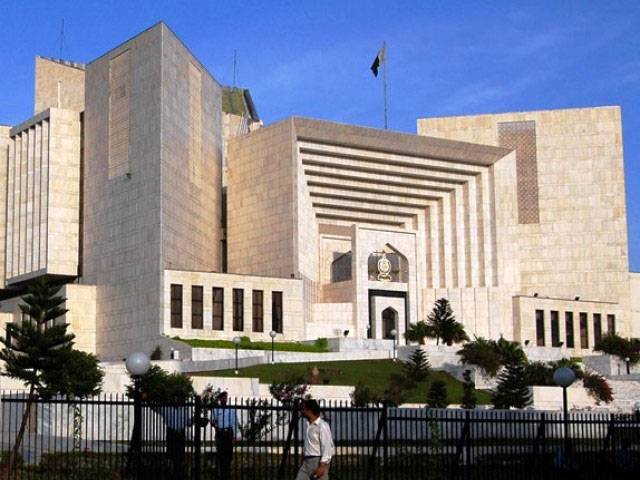ISLAMABAD - Justice Asif Saeed Khosa of the Supreme Court on Thursday observed amendment in the Army Act was approved after sending the 21st Amendment to the President for assent.
Justice Asif Saeed Khan Khosa said the protection was given to unamended Army Act through the 21st Amendment. He said this power had not been given to anyone to make an amendment in the law on his own. Instead of curbing the mischief, a further amendment was made in the Army Act through an ordinance. The executive, not the Parliament, made the amendment in the act, he remarked.
The judge pointed out the amendment in the Army Act was approved after sending the 21st Amendment to the President for assent. He said in Urdu: “Jab ye sara kuchh ulat ho gaya hai to baazi bhi ulat gai hai (since things were done in the wrong way, the whole game plan has failed).
Justice Khosa asked Asma Jehangir, who was representing the Supreme Court Bar Association before the full court of the apex court, how she would prove the amendment in the Army Act was not protected before the constitutional amendment. She replied the notifications issued on January 7, 2015, could have different numbering.
Earlier, while giving arguments, Asma Jahangir contended that before the amendment was made in the Army Act, it was protected and the ordinance preserved in the 21st Constitutional Amendment, adding the two-third members did not vote for the amendment in the Army Act.
Asma Jahangir said all the political leaders were opposed to the establishment of the military courts before passage of the 21st Amendment. “But tweets from ISPR spokesman came and all the political parties gave in.”
Justice Khosa noted that in Mehram Ali case the Supreme Court had stated that military courts could not be established unless there was any provision for them in the Constitution, while in Liaquat Hussain case it observed that unless the military courts were given protection cover, they could not be allowed to work.
Criticising the establishment of military courts through 21st Amendment, Asma said the Parliament has let down the people, adding if they ask parliamentarians about it, it does not mean that the judiciary becomes the monitor.
Earlier, she prayed to the court to interpret the law protected under the Article 8(3) of the Constitution, instead of striking down the 21st Amendment.
Article 8 says, “Laws inconsistent with, or in derogation of, fundamental rights are void.” But clause 3 (b) (i) states: “The provisions of this article shall not apply to any of the laws specified in the First Schedule as in force immediately before the date of commencement or as amended by any of the laws specified in that schedule.”
The SCBA counsel argued that the superior courts, particularly, the Supreme Court, can review the transfer of any trial made by the federal government. She said there can’t be rule of jungle in the country.
She maintained the apex court has been given many powers in the Constitution, adding judges’ oath says they have to protect, preserve and defend the Constitution, but it is their main responsibility to protect the fundamental rights of people. She observed the court could not ignore a systematic widespread violation of human rights. Justice Jawwad S Khawaja questioned who would decide on any violation of the fundamental rights.
In the beginning of her arguments, Asma opposed the Objectives Resolution as salient features and the basic structure theory. The Objectives Resolution was passed by the constituent assembly in the budget session when the presence of the members was thin. She said that two-third members had voted against the Objectives Resolution.
Asma said not the state, but the people, should have faith, adding the state can’t have religion or spirituality.
Justice Khosa said first time Islam became the state religion in 1973 Constitution.
The SCBA counsel argued that the members of the constituent assembly were divided on ideological basis and not on the basis of religion. Asma said the Objectives Resolution was not available in the 1973 Constitution, but was made part of it later. She requested the court to move backward and go to the roots of the Constitution and review all the amendments made in it.
The hearing was adjourned till Monday next.
Saturday, November 23, 2024
MPs backed mily courts after ISPR tweets, SC told
| Justice Khosa observes executive, not the Parliament, amended Army Act

No sit-Ins or gatherings allowed in Islamabad: Naqvi
10:20 PM | November 22, 2024
Govt scheme to provide Rs 1.24bn airfare relief for pilgrims
8:53 PM | November 22, 2024
UN says 2024 'deadliest year on record' for humanitarian aid workers with 281 deaths globally so far
8:46 PM | November 22, 2024
Metro bus service to remain closed on Nov 24 ahead of PTI protest
8:10 PM | November 22, 2024
-
Lahore tops global pollution rankings as smog worsens, AQI reaches hazardous levels
-
Lahore tops global pollution rankings as smog worsens, AQI reaches hazardous levels
-
Hunger crisis to increase in South Sudan, warns UN
-
Pakistan’s judiciary champions climate justice at COP29 in Baku
-
Punjab struggles with persistent smog as Met Office forecast rainfall
-
Punjab residents face escalating smog crisis as pollution levels soar across country
UN Crossroads
November 22, 2024
Smog Trade-off
November 22, 2024
Undersiege Again
November 22, 2024
Land of Vigilantes
November 21, 2024
United in Genocide
November 21, 2024
Proposal to counter increasing cases of harassment
November 22, 2024
Critique of RFE/RL’s Coverage of the SCO Summit
November 22, 2024
Real vs Reel
November 22, 2024
Independent Supreme Court
November 21, 2024
Fat Loss Fantasy
November 21, 2024
ePaper - Nawaiwaqt
Nawaiwaqt Group | Copyright © 2024





